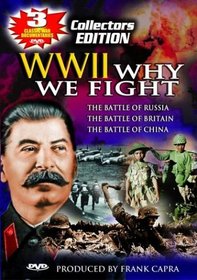| Genres: Action & Adventure, Educational, Documentary, Military & War Sub-Genres: Action & Adventure, Educational, World War II, Military & War Studio: Vintage Home Ent. Format: DVD - Black and White DVD Release Date: 01/06/2004 Release Year: 2004 Run Time: 3hr 19min Screens: Black and White Number of Discs: 1 SwapaDVD Credits: 1 Total Copies: 0 Members Wishing: 0 MPAA Rating: NR (Not Rated) Languages: English |
Search - World War 2 - Why We Fight on DVD
  | World War 2 - Why We Fight Genres: Action & Adventure, Educational, Documentary, Military & War NR 2004 3hr 19min |
Larger Image |
Movie Details
We're sorry, our database doesn't have DVD description information for this item. Click here to check Amazon's database -- you can return to this page by closing the new browser tab/window if you want to obtain the DVD from SwapaDVD.
Click here to submit a DVD description for approval.
Similar Movies
Similarly Requested DVDs
|
Movie ReviewsThe three "Battle" documentaries from Capra's "Why We Fight" Lawrance M. Bernabo | The Zenith City, Duluth, Minnesota | 12/28/2005 (5 out of 5 stars) "Frank Capra's celebrated "Why We Fight" series was made during World War II when the Hollywood director was a major in the U.S. Army Signal Corps. These documentaries are the supreme example of American propaganda during World War II. Originally the films were used to explain the government's policy to the troops that were hastily assembled after Pearl Harbor to be trained and sent overseas to fight. You have to remember that American had been an isolationist nation in the period between the two world wars and what Capra does that is so masterful is convince viewers that Americans were leaning towards supporting the English and entering the war before the Japanese attack made the matter moot. Eventually the "Why We Fight" series was shown to the public in theaters and today they remain a prime source of archival footage for the period.
"The Battle of Britain" was released in 1943 and is one of the transitional volume in the series with regards to the war in Europe as the British make a desperate last stand against the Nazi Luftwaffe. This 54-minute black & white documentary is narrated by Walter Huston and starts with Hitler entering Paris and then looking across the English Channel at his next victim. Inspired by the speeches of Winston Churchill, the presence of King George VI and Queen Elizabeth, and the fighter pilots of the Royal Air Force, the British simply refused to quit in the face of an onslaught of air attacks of the Blitz. Writer Anthony Veiller ("Stage Door," "The Killers") worked as an uncredited director on "The Battle of Britain" along with Capra. "The Battle of Russia: The Nazi March Frozen," on which Anatole Litvak also worked as an uncredited director, was also released in 1943. The 57-minute black & white documentary narrated by both actor Walter Huston and writer Anthony Veiller. "The Battle of Russia" begins with Hitler deciding to betraying his alliance with Stalin and attacking the Soviet Union. However, at the end of this documentary the Soviets stop the Nazis at the battle of Stalingrad and Hitler's army suffers a crippling defeat at the gates of Moscow. "The Battle of Russia," which was nominated for an Academy Award for Best Feature-Length Film Documentary, is a prime example of the way the Soviet Union was presented as a strong ally during World War II (check out "Mission to Moscow" in this regard as well). "The Battle of China: The Assault on the Great Wall" shifts the focus to the Chinese defense against Japanese aggression. Like the previous chapter, "The Battle of Russia," an important part of the intent here is to establish a sense of identification between the American people with a foreign ally, although Capra does not have to gloss over the political ideology of the Chinese the same way he did with the Communist Soviets. This explains why this chapter provides a brief history of China and its people and then details why the Japanese wanted to conquer the country, namely getting the raw materials and slave labor necessary for taking over all of Asia. The War in the Pacific covered, showing the valiant effort by the Chinese to stop the Japanese. Also featured are General Claire Lee Chennault's famous Flying Tigers, the American Volunteer Group who had joined the battle to defend China. This 67-minute black & white 1944 documentary is narrated by writer Anthony Veiller (Walter Houston just does the voice of Abraham Lincoln this time) and Anatole Litvak served as an uncredited co-director. In the next volume, "War Comes to America," the Japanese attack on Pearl Harbor brings the United States into the war. Even today the "Why We Fight" series remains a prime source of archival footage of this period, with film of Joseph Stalin, Adolf Hitler, Benito Mussolini, Haile Selassie, Vyacheslav Molotov, Hermann Göring, and a score of German and Soviet military figures. "The Battle of Russia" is followed by "The Battle of China," which finally introduces the Pacific theater of World War II. In 2000 the "Why We Fight" series was added to the Library of Congress National Film Registry." |












